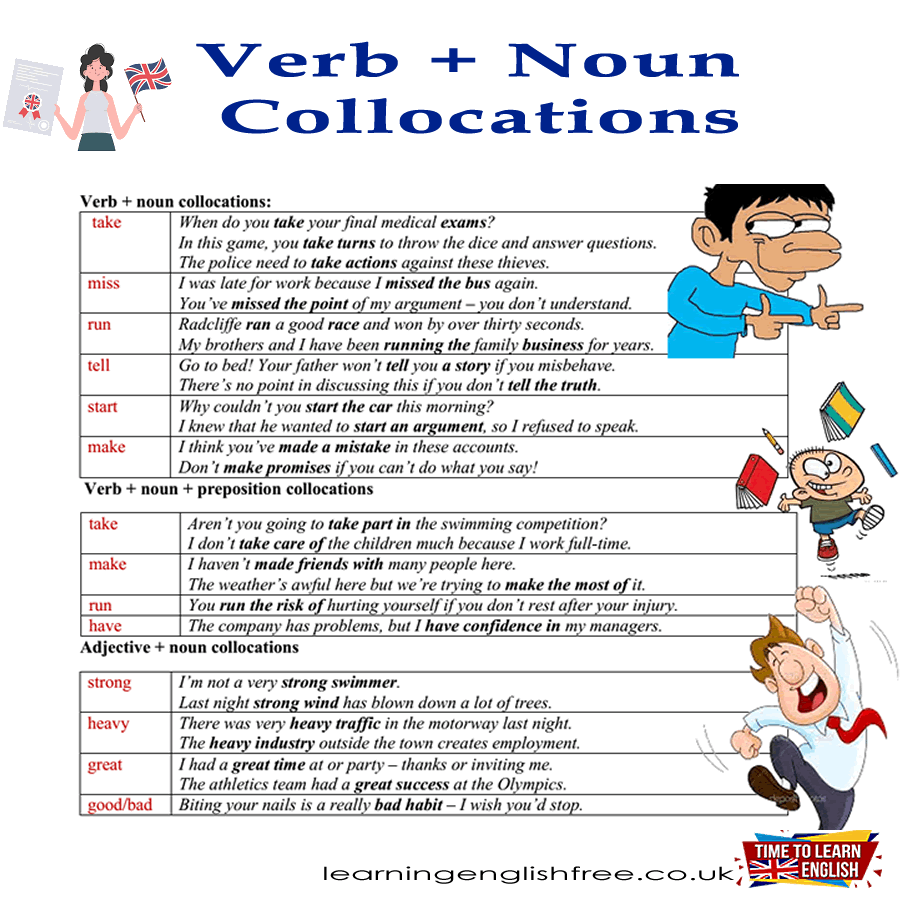
The Art of Collocations in English
Enhancing Fluency with Verb + Noun Collocations
This lesson focuses on the vital aspect of English language learning - understanding and using common collocations, particularly verb + noun collocations. By mastering these combinations, learners will significantly enhance their fluency and naturalness in English communication.
Learning Objectives:
- Recognize and use common verb + noun collocations.
- Develop an intuitive understanding of English phrase construction.
- Improve conversational and writing skills through practical collocation usage.
Useful Vocabulary:
Collocations, verb-noun combinations, fluency.
Part 1: Common Verb + Noun Collocations
TAKE
- "When do you take your final medical exams?"
- "In this game, you take turns to throw the dice."
- "The police need to take action against these thieves."
MISS
- "I missed the bus again this morning."
- "You've completely missed the point of my argument."
RUN
- "Radcliffe ran a good race and won."
- "We've been running the family business for years."
TELL
- "Your father won't tell you a story if you misbehave."
- "There's no point if you don't tell the truth."
START
- "I couldn't start the car this morning."
- "He wanted to start an argument."
MAKE
- "You've made a mistake in these accounts."
- "Don't make promises you can't keep."
Part 2: Verb + Noun + Preposition Collocations
TAKE
- "Will you take part in the competition?"
- "I don't get to take care of the children much."
MAKE
- "I haven't made friends with many people here."
- "We're trying to make the most of the bad weather."
RUN
- "You run the risk of hurting yourself."
HAVE
- "The company has problems, but I have confidence in my management."
Part 3: Adjective + Noun Collocations
STRONG
- "I'm not a very strong swimmer."
HEAVY
- "There was heavy traffic on the motorway last night."
GREAT
- "I had a great time at your party."
- "The team had great success at the Olympics."
GOOD/BAD
- "Biting your nails is a bad habit."
Embracing Collocations for Effective English
Enhancing English Proficiency
This lesson has provided you with a foundation in understanding and using verb + noun collocations, a key element in achieving fluency in English.
Tips for Remembering Collocations
- Practice in Context: Use these collocations in sentences and real-life conversations.
- Listening for Collocations: Pay attention to these combinations in films, songs, and native speakers' dialogues.
- Regular Revision: Revisit these collocations periodically to reinforce your memory.
Practical Applications
- Daily Conversations: Incorporate these collocations to sound more natural in everyday English.
- Professional and Academic Writing: Use these collocations to enhance the quality of your written English.
Continuous Learning and Community Engagement
Continue exploring collocations and other aspects of English. Share your learning journey with our community at www.facebook.com/learningenglishfree.co.uk for more interactive and supportive lessons.
Mastering Collocations for Natural English
Understanding and using collocations correctly is crucial for sounding like a native speaker. Embrace this learning journey and watch your English communication skills soar.
